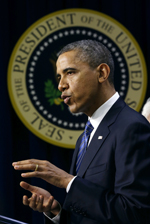WASHINGTON - Republican lawmakers denounced Democratic President Barack Obama’s plan for winding down the U.S. war on terror, calling it a misguided approach that undermines national security.
Obama’s policy speech Thursday, which urged an end to the broad war powers Congress approved to fight al-Qaida after the Sept. 11, 2001, terrorist attacks, was portrayed by Republicans as a lack of resolve in the face of terrorism threats worldwide.
“At a time when we need resolve the most, we are sounding retreat,” Sen. Lindsey Graham, a South Carolina Republican, said on the Fox News Sunday program. “Our enemies are emboldened all over the planet. Al-Qaida in Iraq is coming back with a vengeance.”
Graham said Obama was displaying a “lack of resolve” despite a slew of concerns in the Middle East, including civil war and chemical weapons in Syria and threats to Israel from Syria’s unrest and Iran’s nuclear program.
The president said he would curtail drone strikes and push for an eventual closing of the Guantanamo Bay prison in Cuba. The speech called for a ratcheting-down of the war on terrorism, with Obama saying that the U.S. may be drawn into more wars unless the nation moderates its stance.
RELATED ARTICLE
http://www.arkansas…">Pentagon-led drone policy leaves room for CIA
He also issued new policy guidance that would shift responsibility for strikes by unmanned drone aircraft to the military from the CIA, and said there would be stricter standards for such strikes.
Former House Speaker Newt Gingrich said Obama, as well as the Republican George W. Bush administration, failed to talk honestly about the scope of the global threat posed by terrorism. The president’s speech missed the mark, he said.
“I think it’s just stunningly, breathtakingly naive,” Gingrich, a Republican, said on CNN’s State of the Union.
Calling it the most significant foreign policy address ever given by Obama, Rep. Michael McCaul, a Texas Republican, said on State of the Union that he couldn’t disagree more with the president.
“I found many parts of it disturbing for many reasons,” McCaul said. “I think the rhetoric sort of defies the reality in terms of the threat level that we’ve all been briefed on.”
Sen. Rand Paul, R-Ky., however, has bucked his party’s support of wide-ranging drone strikes, in March leading a filibuster in the Senate over concerns that the government could kill U.S. citizens with drone strikes without giving them due process.
On ABC’s This Week, Paul said the president’s new policy on drone strikes did not satisfy his qualms. “Due process to most of us is a court of law. It’s a trial by a jury,” Paul said. “And right now their process is him looking at some flashcards and a PowerPoint presentation on ‘Terror Tuesdays’ in the White House. For a lot of us, that’s not really due process.”
Sen. Dick Durbin, an Illinois Democrat, backed the president, saying basic values and freedoms may be compromised in a never-ending warlike atmosphere.
“I’m not going to take lightly the terrorism threat against the U.S.,” Durbin said on Fox News Sunday. “But if we are constantly thinking of this in the context of war, we stand at risk of doing things which compromise our values and freedoms.”
Obama ally Sen. Charles Schumer, D-N.Y., said on CBS’ Face the Nation that “having transparency, having rules and engaging other activities other than military to help curb the war on terror - diplomacy, economic sanctions and things like that - is going to be useful as well. So I think the president did a very, very smart pivot, realizing we’re not going to let up on terrorists, but at the same time we’re going to meet the changes in the world.”
In his speech, Obama said he’ll also ask Congress to lift restrictions on transferring Guantanamo detainees to other countries and lift a moratorium on transfers to Yemen.The speech came weeks after Obama renewed his 2009 pledge to close the prison at Guantanamo in the face of objections from Congress, and as a hunger strike at the facility has led to the force-feeding of 30 prisoners.
McCaul warned against closing the facility, especially if it meant moving detainees to the United States. “Name me one American city that would like to host these guys,” he said on the CNN program State of the Union.
More than half the remaining 166 detainees at Guantanamo Bay are Yemeni; of these, 56 have been cleared to go home. Obama has proposed repatriating detainees when he can, but will still face the thorny question of what to do with several dozen men who cannot be prosecuted and who have been deemed too dangerous to release.
Rep. Peter King, R-N.Y., appearing on ABC, said the detention facility had been a policy success.
“Many experts believe it did work,” he said, adding that he was “very concerned about sending detainees back to Yemen.” Noting that Obama had campaigned on a promise to close the prison, he said the president “could have done a lot more than he has done if he was serious about it rather than just moralizing.” Information for this article was contributed by Stephanie Armour and Margaret Talev of Bloomberg News; by Sheryl Stolberg of The New York Times; by Andrew Taylor of The Associated Press; and by Neela Banerjee of the Tribune Washington Bureau.
Front Section, Pages 1 on 05/27/2013

